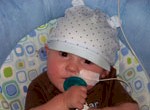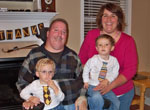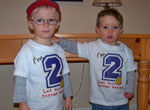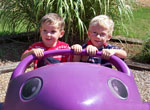Graduate-To-Be Seeks An Employer Who Will Look Beyond Wheelchair
January 8, 1992
Source: The Ambler Gazette
Author: Paul Cathey
Whitpain’s George Butera doesn’t think he deserves any special credit for graduating next month (February) from Temple University with a B+ average even though he is a quadriplegic.
“There are other people on the Ambler campus,” he says, “who are also in wheelchairs and doing the same thing I did. We’re all trying to better our lives.”
George does want people to know that he got his bachelor’s degree with a dual major of marketing and management. And he especially wants that word to get to prospective employers.
“I’m looking for a job,” he emphasizes. “I’ve got that degree and I want to put it to work. I built up a lot of momentum going through school and I don’t want it to stop.”
Butera realizes he has to convince employers that he’s a good bet. “Although I can’t use my limbs,” he points out, “there’s nothing wrong with my mind. And I’ve already demonstrated that I have the drive and determination to get anything accomplished.”
Butera, a graduate of Wissahickon High, has lived in the Blue Bell area all his life with his parents, Gasper and Antoinette Butera. He has two older brothers, Angelo and Michael.
While at Wissahickon High he was a member of the swimming team. He also competed in soccer and lacrosse. The accident that paralyzed him involved the water but it didn’t come until he had been out of high school a year.
George graduated from Wissahickon in 1985 and in the fall of that year enrolled at Temple’s downtown campus intending to pursue a career in engineering.
The next summer, while taking a course at the Ambler campus, he took a weekend trip with friends to Ocean City.
“Entering the ocean,” says George, “I decided to dive under a wave. I’d done it hundreds of time before. On the swim team we’d dive off the blocks into shallow water. I knew how to do it.”
This time something happened to George. “The wave must have pushed me down too hard,” he says, “and I broke my back.”
He had to drop out of school and spent a full year re-learning how to do all the things he’d done with his arms and legs.
He returned to Temple’s Ambler campus in the fall of 1987, changing his major to marketing, adapting himself to new study techniques and, in effect, beginning all over again.
It took him four and a half years for several reasons.
Changing his major negated much of the work he done before the accident. In addition he could only carry four courses a semester rather than the usual five. And he had to attend summer school each year.
Butera commuted to school in a van, which has a lift so he can enter. He’s driven by his friends or by volunteers from his church.
George has high praise for all the people who’ve helped him since the accident. “They’re now a lot of people in my life who’ve done fine things for me,” he says. “A man I didn’t know heard I needed a computer and donated one to me. He’s now a friend and comes around when it needs servicing.”
On George’s wall is a framed platinum compact disc album of The Hooters, a local group who autographed it to him.
He includes all the students at Temple when he talks about those who have helped him. “They were great,” he says, “always there to aid even if I didn’t know them – opening doors, pushing things out of my way.”
At the campus, Butera notes, the students volunteered to take notes for him. They would make him a copy of theirs or use a carbonized type of paper to obtain an immediate copy. When it came time to take tests at school Butera would go to a separate room, be given the questions or problems orally and dictate his answers.
He reads textbooks by having them placed on a lap tray and turnings pages with a mouth stick. He propels his motorized wheelchair and turns it through another mouth tube into which he can sip or puff. The chair responds to whatever commands he gives by varying the length and intensity of these lip movements.
The tube also allows him to use the scanner atop his computer to write or “dial ” phone numbers into his speaker phone.
Butera says the scanner and the speakerphone were provided by the state’s Office of Vocational Rehabilitation. That agency also provided a lot of the money for schooling.
And having gotten that schooling, George Butera wants to put it to work. “I’ve proved I can get it,” he says, “now I want to prove I know how to use it.”



